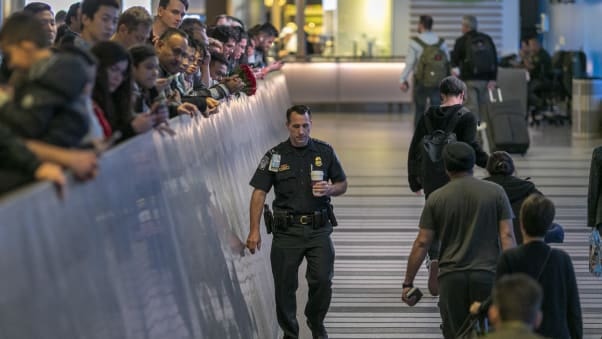What should you keep in mind when traveling in the midst of the coronavirus pneumonia 'storm'?
(Baonghean.vn) - We currently have very little information about the disease caused by the Wuhan coronavirus, and health officials are calling for increased vigilance.
 |
| CDC warns against all non-essential travel to China. Photo: Getty |
That means frequent travelers need to be vigilant about the virus, avoid heavily affected areas, and take some of the usual precautions to avoid the flu and other illnesses.
Here are some things to keep in mind about this viral outbreak for those who travel frequently:
Many recommendations not to go to China
The US Centers for Disease Control and Prevention (CDC) has raised its travel advisory for China to its highest level. The “Level 3 Warning” urges people to avoid non-essential travel to the country.
The US State Department has also increased its warnings. Its January 29 advisory was “Level 3: Reconsider Travel” for most of China, and “Level 4: Do Not Travel” for Hubei Province.
The UK Foreign and Commonwealth Office (FCO) has advised against travel to Hubei province. In its statement, the FCO stated: “If anyone is in the area and can leave, they should do so.”
The FCO advises against all but essential travel to the rest of mainland China.
The Canadian government also issued a travel advisory, urging people to avoid all travel to Hubei province, specifically naming the cities of Wuhan, Huanggang and Ezhou.
On January 23, the World Health Organization (WHO) announced that the Wuhan coronavirus does not constitute a global public health emergency, but the organization is closely monitoring the situation. WHO Director-General Tedros Adhanom Ghebreyesus said: “Make no mistake. This is an emergency in China, but it has not yet become a global health emergency. But it still has the potential to become one.”
Several foreign governments including the United States, Japan, Germany and Italy are evacuating or planning to evacuate their citizens from Wuhan.
 |
| Several airports in the US have implemented health screening measures for passengers arriving from infected areas in China. Photo: Getty |
Airlines are stopping flights to China
Airlines in Asia, Europe and North America are cancelling flights to China. British Airways suspended direct flights between the UK and China on January 29. United Airlines announced on January 28 that it would suspend flights from February 1 to February 8 between its US hubs and Beijing, Hong Kong and Shanghai.
Other airlines, including Lufthansa, Air Asia, Cathay Pacific, Air India and Finnair, have also moved to reduce or suspend services.
Several cruise lines, including MSC, Costa and Royal Caribbean, have also canceled trips to China and increased screening procedures for passengers boarding from Chinese ports.
Advice for those who cannot avoid going to China
The CDC advises people who cannot postpone travel to China to “take enhanced precautions,” including avoiding contact with sick people, animals, and animal markets and frequently washing their hands.
The CDC recommends washing your hands often with soap and water for at least 20 seconds. Alcohol-based hand sanitizer can be used if soap and water are not available.
The agency also said that travel to China should be reported to health care providers, and noted that middle-aged people and those with underlying health conditions may be at higher risk. People who have traveled to China in the past two weeks and develop symptoms of illness, fever, cough, or difficulty breathing should seek medical care immediately and report their symptoms and recent travel to China to their health care provider.
CDC also recommends that people who are potentially infected avoid contact with others, do not travel while sick, and cover their mouth and nose with a tissue or their elbow (not their hands) when coughing or sneezing.
Wearing a mask is less effective than washing your hands
Professor William Schaffner of the Department of Infectious Diseases at Vanderbilt University said he has recently received many questions about whether masks should be worn to prevent infection.
He noted that this is very common in Asia, but the CDC does not recommend it for the community because “there is very little scientific basis to show that people in the community wearing masks actually get any benefit.”
“Washing your hands is always a really good idea to protect yourself from any viruses and other pathogens in the environment,” says Professor Yoko Furuya at Columbia University.
Air travel is part of how the virus spreads.
For areas outside of severely affected zones, air travel could pose an additional risk, as it increases the likelihood of encountering international passengers from areas with high virus prevalence, Furuya said.
“In terms of global disease spread, air travel is often the way that transmission can move more quickly from one country to another,” she said.
Mr. Schaffner also affirmed that the spread of winter respiratory diseases on flights is always a concern. “I am more than once sure that I have personally contracted a winter virus on an airplane when traveling or moving through crowded airports,” he said.
Again, frequent and thorough hand washing is essential to reduce the risk of viral infection.

